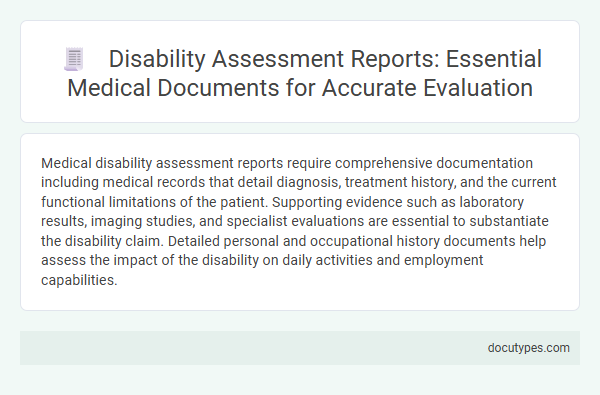Medical disability assessment reports require comprehensive documentation including medical records that detail diagnosis, treatment history, and the current functional limitations of the patient. Supporting evidence such as laboratory results, imaging studies, and specialist evaluations are essential to substantiate the disability claim. Detailed personal and occupational history documents help assess the impact of the disability on daily activities and employment capabilities.
Introduction to Disability Assessment Reports
Disability assessment reports provide a detailed evaluation of an individual's medical condition and its impact on daily functioning. These reports are essential for determining eligibility for disability benefits and support services. You need to gather accurate medical records and relevant documentation to ensure a thorough assessment.
Purpose and Importance in Medical Evaluation
Disability assessment reports require accurate medical documentation to provide a comprehensive understanding of a patient's health status and functional limitations. These documents play a critical role in determining eligibility for disability benefits and planning appropriate medical interventions.
The purpose of collecting detailed medical records, including clinical notes, diagnostic test results, and treatment history, is to ensure an objective evaluation of disability severity. Your cooperation in providing complete and current information helps professionals deliver precise assessments that impact medical and legal decisions.
Key Components of Disability Assessment Reports
| Document Type | Key Components | Description |
|---|---|---|
| Medical Records | Diagnosis, Treatment History, Prognosis | Comprehensive medical history including clinical notes, diagnostic test results, and treatment plans from healthcare providers. |
| Functional Capacity Evaluation | Physical Abilities, Limitations, Work Capacity | Assessment of physical and cognitive functions related to work and daily activities to determine capacity and restrictions. |
| Psychological Evaluation | Mental Health Status, Cognitive Function, Emotional Well-being | Evaluation of psychological conditions, including mental illnesses, stress factors, and impact on functional abilities. |
| Personal Statement | Symptom Description, Impact on Daily Life | Your detailed account of symptoms, challenges faced, and how disability affects everyday activities. |
| Work History and Job Description | Previous Employment, Job Demands | Records outlining prior work experience and the physical or mental demands of past occupations. |
| Supporting Documentation | Medication Lists, Specialist Reports, Imaging Results | Additional evidence such as prescribed medications, specialist opinions, and diagnostic imaging supporting medical claims. |
Roles of Healthcare Professionals in Report Preparation
Healthcare professionals play a crucial role in gathering and preparing documents for disability assessment reports. Their expertise ensures accurate and comprehensive information is provided to support your disability claim.
- Physicians - Provide detailed medical evaluations and diagnostic test results outlining the nature and extent of the disability.
- Therapists - Document functional limitations and progress notes related to physical or occupational therapy interventions.
- Psychologists - Offer psychological assessments and reports on cognitive or emotional factors impacting disability status.
Collaboration among these healthcare providers guarantees that disability assessment reports are thorough and effectively support eligibility determinations.
Standardized Guidelines and Legal Requirements
What documents are needed for disability assessment reports according to standardized guidelines and legal requirements? Disability assessment reports require comprehensive medical records, including diagnosis, treatment history, and functional limitations. You must also provide legal documents such as identification, disability claim forms, and any court or insurance correspondence that supports your case.
Common Medical Conditions Assessed
Disability assessment reports require specific medical documentation to accurately evaluate your condition. Proper records ensure a detailed understanding of your medical history and present limitations.
- Medical History Records - Comprehensive files including diagnoses, treatments, and hospital visits relevant to the disability claim.
- Specialist Reports - Evaluations from neurologists, psychiatrists, or other specialists that detail the impact of common medical conditions like arthritis or diabetes.
- Diagnostic Test Results - Imaging scans, blood tests, and other diagnostic information supporting the severity and progression of the condition.
Documentation of Functional Impairments
Documentation of functional impairments is a crucial component of disability assessment reports. It provides detailed evidence of how your medical condition affects daily activities and overall functioning.
Essential documents include medical records, physical therapy notes, and occupational therapy evaluations. These reports highlight limitations in mobility, self-care, communication, and cognitive abilities needed to support disability claims.
Challenges in Disability Evaluation
Disability assessment reports require thorough documentation, including medical records, physician evaluations, and functional capacity assessments. Gathering accurate and comprehensive information poses challenges such as inconsistent medical histories and varying assessment standards. Your ability to provide detailed and timely documents significantly impacts the clarity and accuracy of the evaluation process.
Ensuring Accuracy and Objectivity
Disability assessment reports require comprehensive medical documentation to ensure accuracy and objectivity. Essential documents include detailed medical records, diagnostic test results, and treatment history.
Accurate disability evaluations depend on objective evidence such as physician reports, specialist evaluations, and rehabilitation notes. You must provide updated and relevant medical records to support the assessment process. Clear documentation of functional limitations and prognosis is crucial for a fair and thorough review.
What Documents Are Needed for Disability Assessment Reports? Infographic

